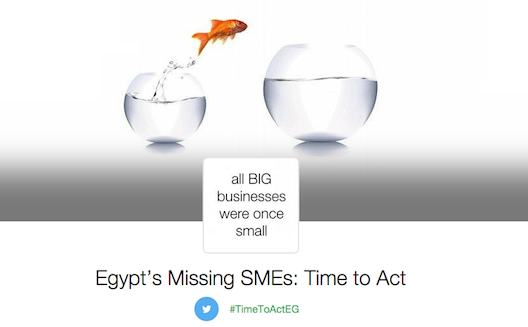Egypt is in urgent need of smaller business


All big businesses were once small. Super billionaire Bill Gates was once a young guy in a garage. His giant, Microsoft, didn’t become a giant overnight. But over time, as it got larger, Microsoft gobbled up many small companies and their competitive technologies.
Smaller businesses are part of any giant’s success. They are suppliers, distributors, and innovators. They are also really important for a country’s economy.
Take Egypt. In the midst of an economic crisis, there is an urgent need to putting the country on the path to recovery. Egypt needs more investment, production, and exports. It needs more new jobs.
But Egypt has a ‘smaller business problem’.
In Cairo on Tuesday, leaders of business, government, and civil society will come together to talk about how big business can help Egypt’s smaller businesses realize their potential role in the economy. The speakers will include:
- Shantayanan Devarajan, Chief Economist of the Middle East & North Africa Region at the World Bank
- Neveen El Tahri, Chairperson and Managing Director of Delta Shield for Investments
- Ravi Kanbur, the T.H. Lee Professor of World Affairs, and Professor of Economics and Management at Cornell University
- Ahmed El Alfi, Founder of Sawiri Ventures
- Gamal Muharam, President of Egyptian Factoring Association
- Sherif El-Diwany, Executive Director of ECES
Egypt’s smaller business problem
Existing Egyptian firms perform below potential. The market conditions they face make for lower productivity, efficiency, and profitability. As a result, they do not produce as much value as they could.
Smaller businesses have the potential, more so than large companies, to energize the economy, through technology, innovation, competition, and new jobs.
But smaller businesses have a harder time getting by, due to their lower capacity to navigate and manage the country’s tough market conditions (including inefficient bureaucracy, low business connectivity, and poor market organization).
This makes them more vulnerable to failure. It also means they will contribute less value, for other businesses and the economy, and in creating new jobs.
Why care about smaller business?
Financiers define size by capital, governments by employment. A business with four employees could be a budding technology company creating a beta product that has astronomical market potential in global ecommerce. Or it could be a small retail shop. There are a bunch of ‘medium’ sized-companies too.
Egypt will do better when circumstances are right for smaller businesses to perform better. Smaller firms have always been important for pushing the giants who drive the big-money deals. This alone merits a focus on firms that can create this kind of value.
Smaller companies drive innovation. Among the most innovative firms in the US (15 or more patents in a four-year period), small businesses produce sixteen times more patents per employee than larger ones (fewer than 500 employees).
Smaller companies also drive employment. Right now in Egypt, about three out of five jobs are in companies with four or fewer employees. Employment is overwhelmingly concentrated in small, young firms, about 40%. This is a good reason to focus attention on firms that employee small numbers of people.
Almost 34 million Egyptians are under the age of twenty. Job creation is a priority for the country.
Egypt has a vibrant and energized tech space. Companies are increasingly being recognized regionally and internationally. But if these smaller businesses struggle more to get by and survive, they cannot drive innovation and competition.
And it’s not just tech companies. Brick and mortar companies can deliver much needed value to the economy, and more jobs too.
Success stories
Not all smaller businesses want to grow. Some smaller businesses would like to grow, but face too many obstacles. Many would likely want to grow if getting by wasn’t already so hard. It is a problem that growth is daunting for smaller businesses.
There is good news, however. There have been many success stories in Egypt when corporates pay attention to smaller businesses.
Mercedes Benz and GM have both successfully worked on supplier development with smaller businesses, to their benefit. Novartis has worked with retail pharmacies to upgrade their small enterprise management, ultimately making the multinational more in profits. Other international and Egyptian firms can share similar success stories.
More success stories will come with a better environment for success for smaller businesses. Getting past the country’s smaller business challenge will take learning from success stories, and failures, from Egypt and abroad. Solutions need to have impact at scale quickly.
Beyond one-stop shops
As former CEO of PIMCO Mohamed El-Erian argued: “the focus on the challenges should not crowd out a simultaneous appreciation of the country’s important attributes and huge opportunities. ”
Luckily, Egypt has a considerable economic upside.
“Egypt possesses lots of economic low-hanging fruit that may be harvested quickly to generate higher growth and employment,” continued the CEO. This is one of four major attributes El-Erian sees as key for putting the country in a stronger position to bounce back.
If the right things get set into motion, the country will begin to see positive self-reinforcing dynamics. The value will then begin to multiply.
Solutions need to go beyond things like one-stop shops for quick business registration, and will have to involve many different kinds of agencies and initiatives. Action by business owners and leaders will be critical. As will ensuring that solutions solve more market problems than they create.
There is urgency to solving Egypt’s small business problems. This is only partly driven by the country’s ticking demographic time bomb.
More innovation, competition, and profits are also good reasons to care about smaller businesses.
There are different types of smaller businesses. There are different reasons to care about their success. That’s OK. But Egypt needs to solve is smaller business problem. The time to act is now.


